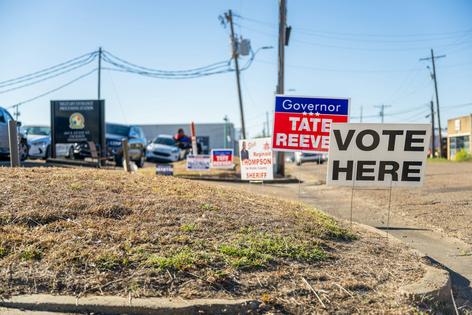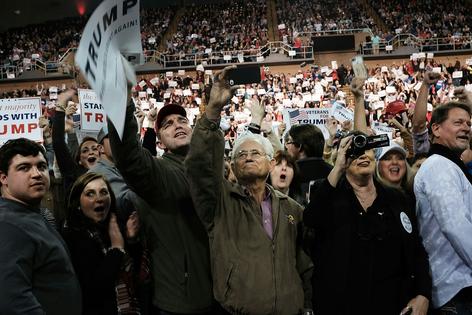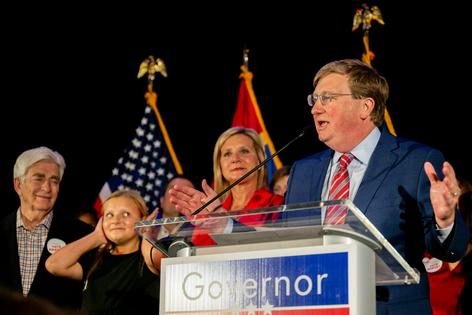How Democrats are making a mistake in rural America – by not showing up
Published in Political News
Rickey Cole, 58, is a farmer and the former two-term chair of Mississippi’s Democratic Party. If anyone understands rural Mississippi voters – and their shift from the Democratic Party to the Republican Party – it’s Cole.
“You learn from losing,” the lifelong Democrat said.
He should hope so.
In 2001, when Cole first served as party chair, Democrats controlled 7 of 8 statewide offices, including governor and attorney general, and both state legislative chambers. Twenty years later, Republicans hold all eight statewide offices and a massive 79-41 majority in the state House and 36-16 majority in the state Senate.
Mississippi, the nation’s fourth-most rural state, defines “rural” as any county with fewer than 50,000 residents or a town with a population of 15,000 or less. In the 2023 election, 51% of Mississippians lived in communities meeting this criteria.
Though Democrats still have an edge in urban centers such as Jackson and Vicksburg, the slow and repeated loss of rural voters is the cause of Cole’s woes.
“Losing them is the motif of my entire career,” he told me.
Cole and Mississippi are not alone.
Democrats have been losing rural voters across the U.S. since the 1960s. But the party has hemorrhaged these voters since 2000.
In 1992 and 1996, Democrat Bill Clinton won 49% of the rural vote in both elections. But by 2008, that number had declined when Barack Obama only took 43% of rural voters.
Four years ago, that number collapsed even more. In 2020, Joe Biden captured about 35% of the rural vote.
The Democratic Party’s collapse in rural America has fueled support for Donald Trump and his “Make America Great Again” movement.
Trump took 65% of the rural vote in 2020, up from 59% in 2016, according to the Pew Research Center.
In all, Republicans won 71% of rural white voters in 2020, a 9-point improvement over 2016.
Though only 1 in 5 Americans live in rural towns, Trump’s apparent monopoly automatically puts nearly two dozen states across the South, Midwest and Great Plains out of reach for Democrats.
One of them is Mississippi. In 2016, Trump earned 59.3% of the vote, soundly beating Democratic rival Hillary Clinton, who got 39.7%. Though Trump still won the state in 2020, his percentage dropped slightly to 57.6%, while the Democratic candidate, Biden, earned 41.1%, a little more than Clinton had in 2016.
As the owner of MLB Research Associates, Matt Barron specializes in rural Democratic races and is considered one of the nation’s leading political strategists on the rural vote.
Beyond the policy debates, Barron said the blame falls on the Democrats.
“They don’t even try to compete in rural America,” he told me.
Cole, the former Mississippi state Democratic Party chair, agrees.
In rural America, he explained, Democrats have stopped grassroots organizing and party-building.
As Barron tells the story, in the hotly contested 2023 Mississippi governor’s race, for instance, the Democratic National Committee ignored local organizers and sent national campaign staffers from Michigan and Ohio to canvass rural Mississippi for votes.
As outsiders unfamiliar with the local terrain, the staffers needed a GPS to navigate the back roads. Lost geographically, they were even more adrift strategically, Barron said.
The Northern urbanites lacked any knowledge of how to push Democratic voters to the polls. The result was lower-than-expected turnout in an election that saw the incumbent, Tate Reeves, a Republican, beat Democrat Brandon Presley by 26,619 votes, or 3.2% of the 820,000 votes cast.
Cole said Presley’s loss is an example of a much larger issue.
“Our politics became nationalized by a cadre of professional operatives,” he told me. “It has become a big industry.”
Cole explained that media consultants earn a percentage of all campaign advertising spending. It maximizes their profits when they spend money in pricey urban markets and ignore rural media. Predictably, Democrats get shellacked in rural America, and the same strategists then blame rural voters for being unreachable.
Ty Pinkins is trying to reverse the Democrats’ failure.
Slim and youthful, the 50-year-old African American army veteran is the Democratic nominee for a U.S. Senate seat in Mississippi. To defeat his Republican opponent, incumbent Roger Wicker, Pinkins is working with Cole to “build a grassroots pyramid.”
The Bronze Star recipient has put 70,000 miles on his Chevy Tahoe canvassing 67 of the state’s 82 counties. His goal is to have a campaign leader in every county and all 1,762 state precincts.
As Cole sees it, Pinkins’ grassroots campaign will last beyond the November 2024 election – and provide the key to a revived state Democratic Party.
But grassroots campaigning is not easy _ and getting lost in rural Mississippi is is not always what one expects.
On a hot summer day, Pinkins took a wrong turn and found himself at a crossroads next to a rickety old house. After he knocked on the screened door several times, the 85-year-old Miss Maggie finally came out.
When Pinkins told her that he was running for the U.S. Senate, she smiled and laughed. Soon, the two shared steaming plates of fried chicken, brown gravy and sweet potatoes. She told the candidate, “Baby, now tell me about yourself.”
Once Pinkins finished, it was Miss Maggie’s turn, and the two talked until dusk. Before he could leave, Miss Maggie went back inside. She returned with a sack of coins.
“I don’t have much time left,” she told Pinkins. “I’m 85 years old. This is all I’ve got, and I’m giving it to you.”
For Pinkins, reaching rural voters is not an impossible dream – though sometimes it takes getting lost and hours of conversation to earn one vote.
This article is republished from The Conversation, a nonprofit, independent news organization bringing you facts and trustworthy analysis to help you make sense of our complex world. It was written by: Jeff Bloodworth, Gannon University
Read more:
Trump’s die-hard support may be explained by one of his most misunderstood character traits – ‘charisma’
Trump and Harris, with starkly different records on labor issues, are both courting union voters
Rural voters don’t necessarily love Walz, despite the camo hat and small-town upbringing
Jeff Bloodworth does not work for, consult, own shares in or receive funding from any company or organization that would benefit from this article, and has disclosed no relevant affiliations beyond their academic appointment.


































































Comments